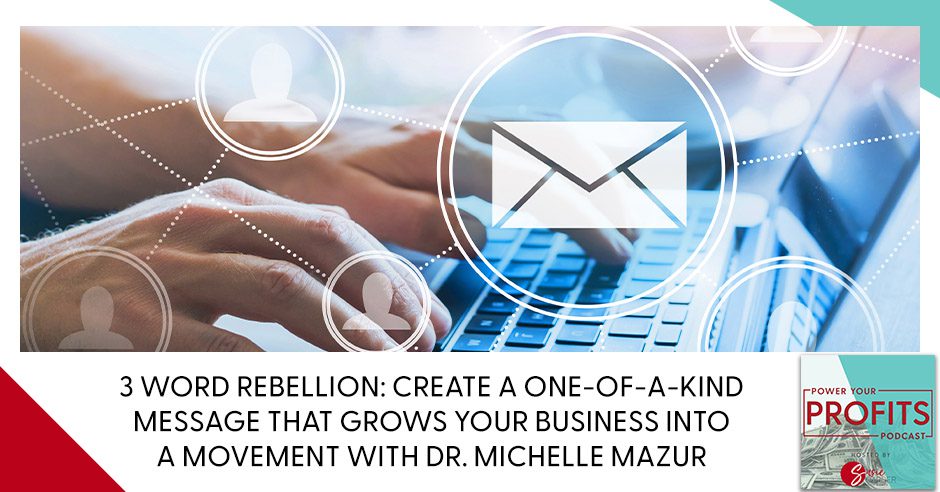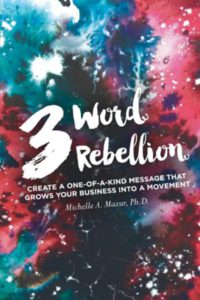
The internet is too noisy, with many different opinions screaming simultaneously. Tune down those noise with your message and let it spread like wildfire. In this episode, Dr. Michelle Mazur, author of 3 Word Rebellion, shares her insights on rebranding yourself to leverage your business’s growth. She also provides some strategies to allow your message to resonate among individuals. To learn more from Dr. Michelle’s wisdom, tune down those noises and tune in to Power Your Profits Podcast!
—
I am so excited for you to meet Dr. Michelle Mazur. She is a messaging expert who works with brilliant business owners who are shaking things up but have trouble talking about it. Do you know the feeling that you know what you want to say but to get it out there succinctly in that 30 seconds or less? She combines tools of successful social movements and qualitative research skills that she earned as a communication PhD to help us craft and create a captivating message. She’s the Author of the 3 Word Rebellion and the host of the Rebel Uprising podcast. Please welcome my friend and my guest, Dr. Michelle.
—
Michelle, thank you so much for joining us. Why don’t you tell everybody who you are in the world, what your secret sauce is, and what your magic is?
I’m Dr. Michelle Mazur. I’m the CEO of Communication Rebel. I am the Author of the 3 Word Rebellion. I’m a podcast host with nearly 300 episodes, which I’m proud of.
That’s a lot for everyone that does not do a podcast. You should be proud of that.
We are hitting 300. I was like, “That’s amazing.” My passion in this world is that I’m focused on helping people who I affectionately call the overlooked experts. These are people who are amazing at what they do. They get their client’s incredible results, yet the world doesn’t know about them because they can’t communicate their expertise, and marketing feels like it’s not gone well, so they think it can’t work for them. My job is to help them create this one-of-a-kind message called the 3 Word Rebellion and help them figure out how to lead people to their work so that real experts get hired. That is my mission in life.
I love it because, in that intro, you are like, “I agree.” You are trying to resonate. Talk about how a business identity crisis catapults your business.
This was in 2016 so that was a year in and of itself. At that time, I was working with speakers. I was a public speaking coach. My specialty was creating that keynote speech and helping people with their speaker marketing. I had recorded the last episode of my podcast for the year and was like, “I don’t have anything else to say. I don’t want to be talking about this anymore.”
I don’t want to be talking about speaking or how to get speaking gigs. I felt like Google Search could replace me. It was like, “No. This isn’t a line. This isn’t who I want to be.” At the same time, I was also seeing how my clients would take the keynote speech we created and then use it in a bunch of different ways.
It would become copy on their website or a three-part video series they used for their opt-in. I’m like, “My work has so much more worth and value.” It’s funny because everybody tells you to niche down and I’m like, “This niche is too confining. I can have a bigger impact on my work.” That was the time. It was near Christmas, and I always took those weeks off. I was sitting with the snacks.
That’s when I had an epiphany moment about this idea of the 3 Word Rebellion. I didn’t know it was called that then. It was the idea of like, “Do you know what social movements and entrepreneurs have in common? They both have a very short, captivating, curiosity-provoking message that is encapsulating the change they want to create, whether that’s Black Lives Matter, Me Too or Start With Why and The 5 Second Rule.
I’m like, “Isn’t this curious? These two things go together. What if I took questions from the social movement site? What are you rebelling against? What’s the change you want to create?” I had my clients write on those and dump out their brains because they have thoughts. Could I come up with this reword message for which they could be known? It ended up working, which was great. That was the thing that helped me figure out, “What’s next in my business?”
It’s getting us clear. People make it wrong when you are done with something or have completed something. They are like, “I have to do this like a jail sentence.” No. That’s a job if you have to do it like a jail sentence. It takes courage to stop totally because then you have to rebrand. You got to re-look.
Redo all your copy on your website. Let your existing audience know that this is the thing that’s happening because that was one of the things I did once I figured out it was called the 3 Word Rebellion. I was like, “Everyone. I have this new idea. Come to this webinar I’m doing. There’s no pitch, no anything. I just want to talk about this and see if it’s valuable and what feedback you had.” I had a huge response. People showed up, and they were like, “I’m really interested in this.” It’s a lot of work but if something is not a fit and it feels like a slog every day, why do it?
When do you learn inside of doing that whole rebrand? This is great because now you have to put a fresh set of eyes on it or websites over there like, “Whatever, I put it together. I’m not looking at it anymore.” Every time we talk, Michelle, I go back to my website and I’m like, “I got to talk to Michelle.” You move, and then you are like, “Next. Is it relevant?” What did you learn from your rebranding?
I feel like I learned a lot. Number one, it’s easier to pivot than you think it is. It’s easier to rebrand, especially if you are radically transparent with your audience about what’s going on and giving them the choice. It’s like, “If you want to stay and hear about these things, please stay and hear about these things.” Some people leave but not many. Most people will stay and still want to learn from you, and then I realized the thing I neglected the most was the copy on the website because I got excited about doing the new work and writing a book about it.
I tweet some stuff but it wasn’t quite right. I had an old video on there, and it wasn’t to the day I was on Amazon. I don’t recommend people read their Amazon reviews but somebody was like, “This is a great book but her website isn’t in alignment with what this book is teaching.” I’m like, “I got to get this done.” It’s so important that the way you show up on podcasts, in your book or however people first find you, then they go to your website, you need to have that consistent message across.
I was like, “I’m not doing that. Let’s take a pause. Let’s rewrite this.” We did a little bit of a brand refresh on the website. We kept the essential branding but then redid the home page, the service page, and the about page so that was more representative of the work I’m doing. Don’t neglect your website. It will come back and bite you in the butt because somebody will write a review on Amazon that’s like, “She’s not walking her talk.”
[bctt tweet=”Don’t neglect your website. It will come back to you because somebody will write a review on Amazon.” via=”no”]
It’s a process because your birthing is brand. You don’t know what it is. You scrap the old brand until you define it. It’s market research. I heard that, and somebody was snotty. They communicate with me. It also gave us the wake-up call to go, “Let me come back to here.” If you are the solopreneur and you are the butcher, the baker or the candle stick maker, you are rebirthing this full big thing that had nothing to do with that.
Instead of bubble gum, shoestring, bandaid, and duct tape, you focused over here to get the content and the feedback. That’s as you see as a website. I don’t want to throw the baby out with the bath water because then you put something up that’s half-ass or you didn’t think it through. You get committed to, “I said that, so I have to deliver that.” Sometimes, what you said isn’t what you have to deliver.
Especially when you are birthing a new framework and a new way of working with people, you want to be able to tweak and evolve it. Also, you are still actively gathering the client language to write copy for the website. It’s hard when the thing you are doing is this moving target to birth a new website with a brand new copy because the copy is probably the hardest part of birthing the new one.
I was still getting clear on the message for the 3 Word Rebellion messaging framework. I came up with this, and a lot of entrepreneurs face this like, “You come up with this great idea, and maybe you have a catchy name or a three word rebellion for it.” You are like, “How do I talk about this? I can get people’s attention. People are interested but then what do I need to say to move people towards wanting to work with me?”
That was a struggle that I had. I was like, “I have this cool new thing. People like the idea of having something that is a start with why caliber message, but then how do I communicate what this is all about, what it does, and what other messaging you need to make it work?” That was the challenge that came next.
What was the phase from when you decided to rebrand to get your assets in place? People have unrealistic expectations from people like you to go, “Get my messaging done. I’m just learning.” People want you to spit it out. There’s a process, especially coming from a messaging expert, to go, “What was that process for you like the timeline?” People have realistic expectations going in.
It was a good three years, quite honestly, because it was this exploration of working with it with one-on-one clients and finding out, refining the process, and creating that offer to sell. It was like, “I’m going to talk about this on the podcast and start building content around it. I need to create the book because this needs to be a book. I need a new opt-in and a new lead magnet.” I see this all the time.

When I work with people on their messaging, the thing we do in our last session is we discuss their marketing strategy and then, “What marketing assets do you need to create because you are going to spend the next six months to a year redoing the website copy and implementing it into your social media. Maybe you are launching a podcast, relaunching a podcast or you need a new lead magnet.” All of that takes time to build out those marketing assets. I’ve had some clients do it quickly. I don’t know what else you are doing because you are just executing this. Typically, even for my clients, we do their message, and it can take a year to eighteen months to get it fully implemented.
For me, to own it as the expert and go, “Let me own this new direction and conversation. When did you go from building the same audience but a different audience to these super fans of people who become your raving fans and love you?
I have the good fortune of being very consistent. I know a lot of people struggle with that. They are not imaginary. I have real people in my audience but in my head, when I’m like, “I need to record a podcast. I need to send an email to my list,” I see the people expecting it from me, and that gives me the motivation to show up and do it. For me, it was that consistency but also consistently being on message.
This is where a lot of business owners screw things up. They feel like frequency is enough. It’s like, “If I show up five days a week on Instagram, if I email my list twice a week or if I post my blog every single week, that’s going to be enough.” No. You have to be consistent in your message. You have to be able to repeat yourself and take an idea and talk about it in 27 different ways because that’s actually how you get known for your message.
[bctt tweet=”You have to be able to take an idea and talk about it in 27 different ways because that’s how you get known for your message.” via=”no”]
That’s how people know like, “Do you need messaging? You should check out the 3 Word Rebellion because that’s eventually what you want.” You want people to be these champions of your message but if you are all over the place, you can’t do that. For me, I had the blessing of wanting to be consistent as far as frequency but also I was very intentional in creating the message and figuring out what works, what doesn’t, and what do I need to double down on to get people excited about the work that I’m doing.
What do we need to do if we are struggling? For a lot of entrepreneurs, it’s not their jam. You are bag-baring stealing like, “Michelle says this. Susie says this.” You are bubble gum, shoestring, and Band-Aid, everybody else’s message to create your own. How should we start that so that we all emulate other people?
I’ve done this with clients before. For some of my clients, I’ve needed to put on an information detox where it’s like, “I don’t want you consuming anyone else’s content for a while.” I’ve had a client where she was consuming all these other people’s contents, and then it was like, “So and so says this and that.” I’m like, “What do you say?”
You have to have that clarity of mind where you are not always taking in what everybody else is doing. If you need to but some people don’t. Some people are like, “I stay in my own lane.” The second part of this that I use for myself and my clients is a process of free writing. We have to get what’s up here in our head out onto paper where we can deal with it because your message doesn’t come from here.
It comes from having it in a place you can see it and interacting with other people. I use a free writing process with my clients. The messier, the better. Asking them questions about, “What ticks you off? Let’s brain-dump about all the things that tick you off. What world do you want to live in?” Hung up on how to do it. You get those ideas out of your head, and then you can start seeing patterns like what things you are saying again and again or maybe there’s a certain turn of phrase you always use.
I always tell my clients, “Your three-word rebellion already exists. It’s already in the things that you are saying, and it’s our job to flush it out to unearth it because it’s there.” I have found 3 Word Rebellions in weird places like footers of websites where I’m like, “This is interesting.” If somebody says something that’s a throwaway phrase, I’m like, “That could be something that’s curiosity-provoking.”
If we don’t get our ideas out of our brains and somewhere where we can see them, it’s hard to find your message. It’s hard to find your message anyway because you are so close to the work you do. You don’t understand what’s truly important to other people. You see it through your expert lens. I always say, “Experts are obsessed with their solutions and what your clients want.” They want to benefit from your expertise. They don’t want to be the expert themselves.
Sometimes, I always tell my students, “You are teaching Calculus, and people need basic Math. You are going way too far.” I don’t want people to think that I’m dumbing it down. You got to start with what they know and build on what they have versus going, “I’m going to go to the finish line. This is where we will be,” and you lose them.
I have a PhD in Communication, and my 3 Word Rebellion framework is based on a lot of different communication theories that inform the work I do. I rarely talk about them. Sometimes I do, but my clients aren’t like, “Tell me, what’s the social psychology theory you are using to inform this?” They don’t care. They just know it works. That’s what they want.

We would not follow you if you said that. We would be like, “No. Cheat away over my head.”
It’s like, “Why are you talking about the elaboration likelihood model? I don’t understand this.”
Let’s pivot a little bit because some of my best lessons have been from my biggest mistakes. I love when people talk about the lens and successes but failure or mistake is where we get our stripes and our battle scars. We don’t want our clients to feel that way. We want clear like, “Let me help you. You might make another mistake but do not make this mistake.” What would you say has been one of your biggest learning lessons, failures, and mistakes, and then what did you learn from it?
I always struggle with questions like this, not because I’m perfect and don’t make mistakes. I always learn so much from my mistakes that they end up feeling like wins. I’m giving you an interview question. My weakness is that I’m a perfectionist, and it’s not that way. It’s when I look at the totality of my business. I learned things. One of my big learnings was that I launched a group program way too soon in my business.
I was like, “I’m going to do this group thing, and I also undercharged for it.” It’s the first time you do a group program, and it fills up pretty easily because you have super fans, and you are like, “It’s always going to be this easy.” It’s not. I didn’t have the audience to support it. Each round got tougher, and eventually, I let it go and doubled back down into one-on-one work because it was more lucrative. I’m glad I did it.
Now, when I think about the next project that I’m working on, which is more of a community-based offer, I’m like, “At least now I have an audience.” I know I’ve had 300 people go through the paid workshops that I teach, so I have this audience of people who are like, “We like your stuff.” I launched a community-type offer, and I know people will come to it versus launching this group program I did in the past when I had no business launching anything group. I wish someone would’ve taken me aside and said, “Michelle, focused on the one-on-one stuff for a while.”
That’s the hype that’s out there but there is a time and a place for it. There’s time and a place for what is the highest income-producing activity. If you don’t have the database to support a group, it is pulling teeth. If you are not marketing consistently, meaning advertising and getting a ton of leads in every month, it’s hard. It doesn’t have to be hard. It has to be systemic.
We choose to struggle because we are trying to rush to the finish line, whereas the whole field. I’m not a sports person but in one job, it takes that time to do it. I’m the same way. I look at what I am learning and the failure inside of a breakdown. Sometimes when the world is big, you can’t help but be Molly walked in the face.
If you think about the group program, it hurt because I did believe the marketing hype that, “If I could launch this, then people would want it, and it would be easy to get people in.” It was so much work for little return on investment that I’m like, “Why am I doing this? This doesn’t make any sense.” Nobody will tell you that like, “You have 200 people in your audience, maybe don’t launch a group program yet.”
That’s why we ask the question so they can share and learn. I keep saying it but if I hear it from you, they will go, “Maybe she’s not discouraging. I want it to win when it wins.”
There’s nothing wrong. The online space villainizes one-on-one work like, “You shouldn’t be trading dollars for hours.” If you price appropriately, one-on-one work can be lucrative. It’s way easier to sell.
Less work, depending on the model. This is the Power Your Profit show, and we are about building profitable businesses, not just building jobs. To this date, it changes in different seasons. I’m in a different season. I’m more seasoned than some. I live in my wealth strategies versus 10 or 20 years ago. It’s definitely at higher risk. Now, it’s less risky because I’m in a different season. What are the wealth strategies that you have been using?
For my business, one of the things that have helped me the most was, Profit First by Mike Michalowicz. It’s setting that up in my business so I can understand, “When I get a lump sum of money in and how much needs to go to me to pay me versus how much needs to go to the tax account, how much is going to op X, and then what’s going into profit.” What I love is that you are always building up the profit, and then once a quarter, you can take 50% of what you’ve built and invest it or go on vacation with it.
I have also seen how applying Profit First even to my personal and thinking about, “I have an elderly cat who needs vet visits twice a year, and those are $500 a pop.” I need an account and put money away so that when his next vet visit comes, I’m not like, “Crap, I got to get the money together.” It has been this great way of understanding that your money needs a purpose and it needs a job.

Being able to figure out what jobs my money need helps me build wealth. It also helps me pay my taxes. I’ve never gotten a big Tax Bill when I’ve been using profit first. Even if I owe, I still have money in the tax account, so I can pay $1,000 or $2,000 I owe, so it’s not a big deal. I’m glad I did that early in my business.
If you could look back and, let’s say you are at the end of your season, what do you want to be remembered for? What’s that one thing?
My whole life has been about communication since I was fifteen in high school. I’m helping people become better communicators about the value they are creating in the world, the message that they want to share, and the movements they want to build. I want to be known as the person who stood behind them and helped them craft what to say, so other people would be inspired and motivated to change and make a difference.
I love your energy and who you are. I love your authenticity and your being you as a woman. I appreciate the stand that you make for us as entrepreneurs. I get that it’s heart-centered. You lead with your heart, not your pop book, which I love, and then the money comes. You do have a prize for us. We love prizes. We are prize-oriented. What is the gift that you are giving us?
I have a mini audio workshop about the 3 Word Rebellion. If messaging is something that you feel you are struggling with or need to be more clear about so that you can show up and market your business. You can grab The 3 Word Rebellion mini audio course at 3WordRebellion.com.
[bctt tweet=”If messaging is something you feel like you’re struggling with, you need to be clearer about it so that you can show up and market your business.” via=”no”]
Even if you are struggling, it is still resonating with what you are doing now. It’s everything that we are doing. It’s not that you are struggling. It’s like, “Is this congruent? Is the tongue in my mouth and the tongue in my shoe going in the same direction? Is what I’m saying and what I’m doing completely different?” I like you to visit it to go, “That’s old,” to keep you fresh and relevant, not just doing it to do it. If you loved this message and you love Michelle, please share it with our tribe and your community if someone in your community needs to hear this.
Sometimes, it comes better if you are like, “I thought of you when I was tuning in to Susie and Michelle.” We would love your support and supporting Dr. Michelle. I love that my girl earned that. Like and follow. Go check out her website. Go download her free resource. It’s juicy. Michelle, thank you for your time. Thank you for being in the world. We appreciate you.
You are welcome, Susie. Thank you for having me.
Have a blessed day.
 Michelle Mazur is a messaging expert who works with brilliant business owners who are shaking things up but having trouble talking about it. She combines the tools of successful social movements with the qualitative research skills she earned in her Communications Ph.D. to help them craft their powerful, captivating message. She is the author of the 3 Word Rebellion & Host of the Rebel Uprising podcast.
Michelle Mazur is a messaging expert who works with brilliant business owners who are shaking things up but having trouble talking about it. She combines the tools of successful social movements with the qualitative research skills she earned in her Communications Ph.D. to help them craft their powerful, captivating message. She is the author of the 3 Word Rebellion & Host of the Rebel Uprising podcast.
COPYRIGHT © 2024 SUSIE CARDER | DESIGNED BY LUTZ MULTIMEDIA LLC